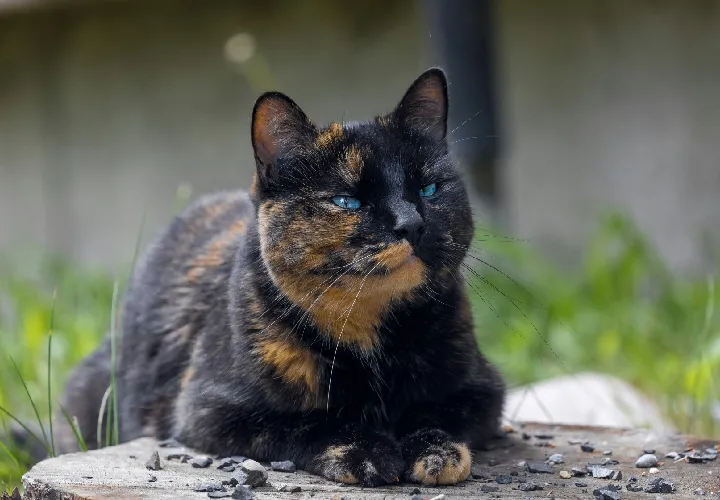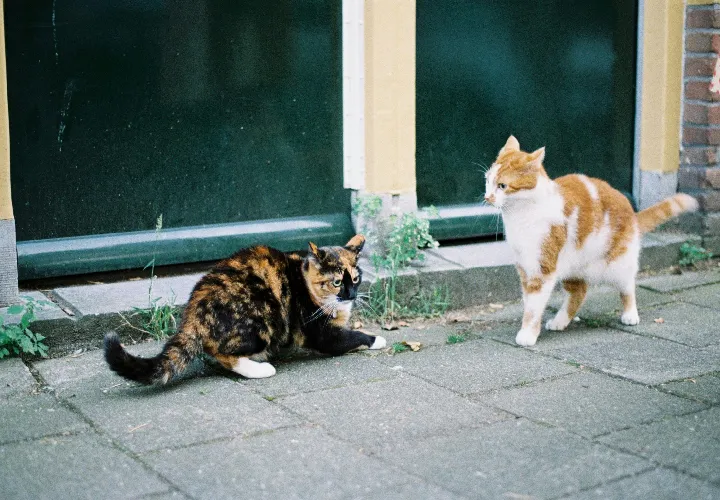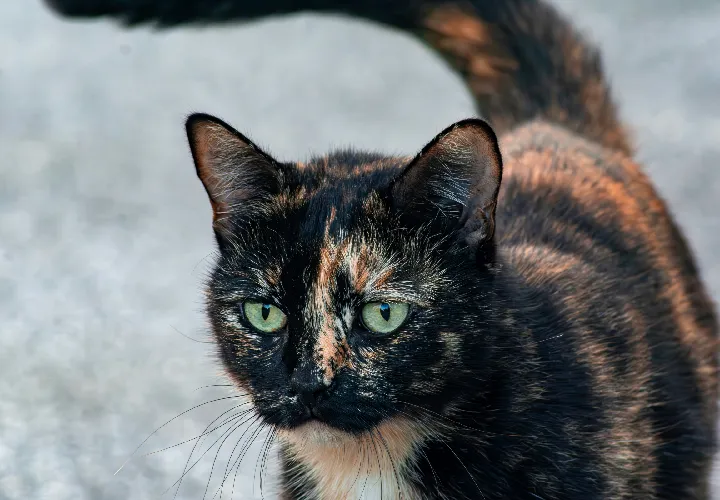
Welcome, fellow animal enthusiasts! Today, we’re diving into the fascinating world of tortoiseshell cats.
These uniquely colored felines have captivated pet lovers for generations with their striking appearance, intriguing genetics, and the wealth of folklore surrounding them.
Whether you’re a proud tortoiseshell owner or simply curious about these remarkable creatures, in this article will explore everything you need to know about tortoiseshell cats.
From their distinctive looks to their vibrant personalities, we’ll uncover why these felines hold such a special place in the hearts of cat lovers worldwide.
Tortoiseshell cats, affectionately known as “torties,” are renowned for their stunning and distinctive coat patterns. These felines sport a beautiful mosaic of colors, typically combining black, red, and orange hues in a mottled or patched distribution.
The name ‘tortoiseshell’ comes from the striking resemblance their coat bears to the shell of a turtle. However, perhaps ‘turtle shell cats’ might have been a more accurate moniker!

Each tortoiseshell cat boasts a truly one-of-a-kind coat pattern, making them a favorite among those who appreciate individuality in their pets.
No two torties look exactly alike, which adds to their charm and appeal. Their coats can range from bold, contrasting patches to subtle, blended swirls of color, creating a visual feast for the eyes.
One of the most fascinating aspects of tortoiseshell cats is the genetics that give rise to their unique coloration. The tortoiseshell pattern is the result of a genetic quirk related to the X chromosome, which carries the genes for orange and black fur colors.
This genetic peculiarity leads to an interesting consequence: the vast majority of tortoiseshell cats are female.
Here’s why: Female cats have two X chromosomes, while males have one X and one Y chromosome.
Therefore, for a cat to display both orange and black fur colors, it needs two X chromosomes – one carrying the gene for orange fur and one for black fur.
Male tortoiseshell cats do exist, but they are incredibly rare. In fact, only about one in every 3,000 tortoiseshell cats is male. Additionally, these rare male torties usually have a genetic abnormality called XXY Syndrome (also known as Klinefelter Syndrome), which gives them an extra X chromosome.
Due to their rarity, male tortoiseshell cats are highly sought after by enthusiasts and breeders alike.
Interestingly, most male tortoiseshell cats are sterile because of their genetic makeup. However, there have been extremely rare cases of fertile male torties, which makes them even more valuable in the breeding world.
Beyond their striking appearance, tortoiseshell cats are known for their vibrant and distinctive personalities. While every cat is an individual, many tortie owners report similar traits that seem to be common among these colorful felines.
Tortoiseshell cats are often described as:
The term “tortitude” has been coined by some cat enthusiasts to describe the sometimes feisty and strong-willed nature of tortoiseshell cats. While this isn’t a scientifically recognized trait, many tortie owners swear by the unique personality quirks of their beloved pets.
Throughout history, tortoiseshell cats have been the subject of various superstitions and folklore across different cultures. These beliefs have contributed to the mystique and appeal of torties as pets.
In many parts of Europe and the United States, tortoiseshell cats are considered to be lucky charms. This association with good fortune has made them popular pets for those hoping to invite a little extra luck into their lives. Some specific beliefs include:
While these beliefs are certainly entertaining, it’s important to remember that the true value of a tortoiseshell cat lies in their companionship and the joy they bring as pets, rather than any supernatural abilities!
If you’re considering adding a tortoiseshell cat to your family, or if you’re already a proud tortie owner, here are some tips for providing the best care for your colorful companion:
If you’ve fallen in love with the idea of owning a tortoiseshell cat, there are several ways to go about finding your perfect feline friend:
Remember, while the tortoiseshell pattern is striking, it’s the cat’s personality and compatibility with your lifestyle that matters most when choosing a pet.
Q: What makes tortoiseshell cats unique?
A: Tortoiseshell cats are known for their striking coat patterns that combine black, red, and orange hues in a mottled or patched distribution, making each cat’s appearance truly one-of-a-kind.
Q: Why are most tortoiseshell cats female?
A: The tortoiseshell coat pattern is linked to genetics involving the X chromosome. Female cats have two X chromosomes, allowing them to express both orange and black fur colors, while males typically have only one X chromosome.
Q: What are the personality traits of tortoiseshell cats?
A: Tortoiseshell cats, or “torties,” are often described as intelligent, friendly, independent, vocal, demanding, and playful. They have a reputation for their unique blend of affection and feistiness, often referred to as “tortitude.”
Q: How can I care for a tortoiseshell cat?
A: Providing regular attention, grooming, veterinary care, a balanced diet, and environmental enrichment (toys, scratching posts) are essential for keeping a tortoiseshell cat healthy and happy.
Q: Where can I find a tortoiseshell cat for adoption?
A: Tortoiseshell cats can often be found in animal shelters, breed-specific rescues, through reputable breeders specializing in breeds like American Shorthairs or British Shorthairs, and online adoption platforms dedicated to cats.
Tortoiseshell cats truly are a wonder of the feline world. From their stunning, individualistic coat patterns to their vibrant personalities, these cats have a way of leaving an indelible mark on the hearts of those who know them.
Whether you believe in their lucky powers or simply appreciate their beauty and charm, there’s no denying that tortoiseshell cats make fascinating and rewarding companions.

If you’re fortunate enough to share your life with a tortoiseshell cat, you’re in for a colorful adventure filled with love, laughter, and perhaps a touch of “tortitude.” And who knows? Maybe some of that legendary tortoiseshell luck will rub off on you too!
Remember, every cat, regardless of their coat color, deserves a loving home.
If a tortoiseshell cat has captured your heart, consider opening your home to one of these special felines. You might just find that they bring a whole new dimension of joy and companionship to your life.
Leave a comment